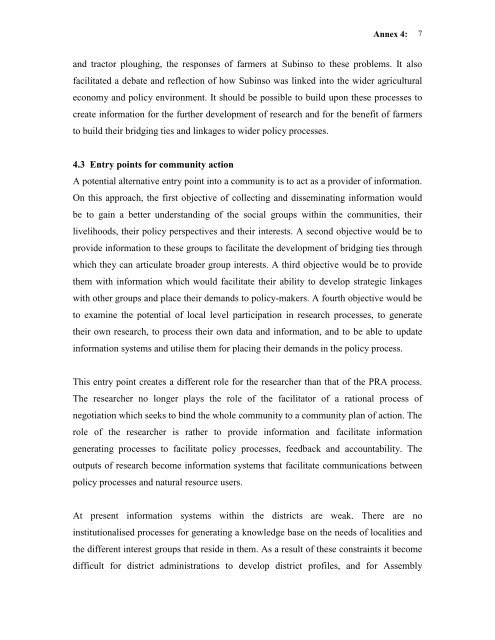Poverty Dimensions of Public Governance and Forest Management ...
Poverty Dimensions of Public Governance and Forest Management ...
Poverty Dimensions of Public Governance and Forest Management ...
You also want an ePaper? Increase the reach of your titles
YUMPU automatically turns print PDFs into web optimized ePapers that Google loves.
Annex 4: 7<br />
<strong>and</strong> tractor ploughing, the responses <strong>of</strong> farmers at Subinso to these problems. It also<br />
facilitated a debate <strong>and</strong> reflection <strong>of</strong> how Subinso was linked into the wider agricultural<br />
economy <strong>and</strong> policy environment. It should be possible to build upon these processes to<br />
create information for the further development <strong>of</strong> research <strong>and</strong> for the benefit <strong>of</strong> farmers<br />
to build their bridging ties <strong>and</strong> linkages to wider policy processes.<br />
4.3 Entry points for community action<br />
A potential alternative entry point into a community is to act as a provider <strong>of</strong> information.<br />
On this approach, the first objective <strong>of</strong> collecting <strong>and</strong> disseminating information would<br />
be to gain a better underst<strong>and</strong>ing <strong>of</strong> the social groups within the communities, their<br />
livelihoods, their policy perspectives <strong>and</strong> their interests. A second objective would be to<br />
provide information to these groups to facilitate the development <strong>of</strong> bridging ties through<br />
which they can articulate broader group interests. A third objective would be to provide<br />
them with information which would facilitate their ability to develop strategic linkages<br />
with other groups <strong>and</strong> place their dem<strong>and</strong>s to policy-makers. A fourth objective would be<br />
to examine the potential <strong>of</strong> local level participation in research processes, to generate<br />
their own research, to process their own data <strong>and</strong> information, <strong>and</strong> to be able to update<br />
information systems <strong>and</strong> utilise them for placing their dem<strong>and</strong>s in the policy process.<br />
This entry point creates a different role for the researcher than that <strong>of</strong> the PRA process.<br />
The researcher no longer plays the role <strong>of</strong> the facilitator <strong>of</strong> a rational process <strong>of</strong><br />
negotiation which seeks to bind the whole community to a community plan <strong>of</strong> action. The<br />
role <strong>of</strong> the researcher is rather to provide information <strong>and</strong> facilitate information<br />
generating processes to facilitate policy processes, feedback <strong>and</strong> accountability. The<br />
outputs <strong>of</strong> research become information systems that facilitate communications between<br />
policy processes <strong>and</strong> natural resource users.<br />
At present information systems within the districts are weak. There are no<br />
institutionalised processes for generating a knowledge base on the needs <strong>of</strong> localities <strong>and</strong><br />
the different interest groups that reside in them. As a result <strong>of</strong> these constraints it become<br />
difficult for district administrations to develop district pr<strong>of</strong>iles, <strong>and</strong> for Assembly
















